Advertisement
Coronavirus Coverage
Family Of Veteran With COVID-19 In Holyoke Soldiers' Home Says State Response Is 'A Nightmare'
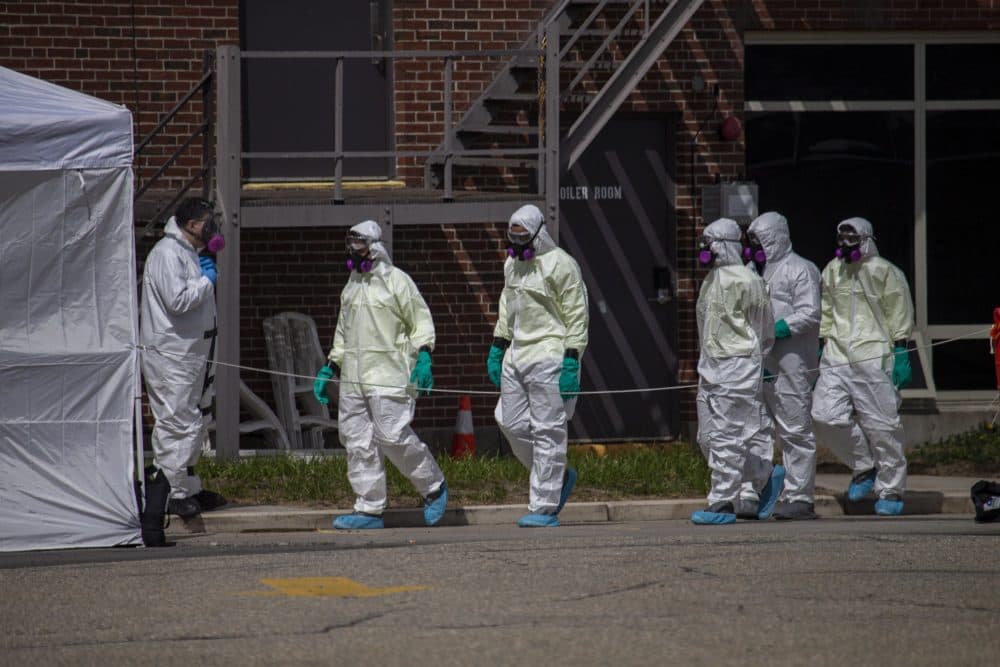
In the two years that 99-year-old John MacKay has lived at the Holyoke Soldiers' Home, one of his family members has talked to or seen him every day.
But since the devastating coronavirus outbreak at the state-run facility became public on Monday, MacKay's daughter, Ellen McEwan, has only talked to him twice. Other family hasn't had luck either. Calls to the special family hotline touted by Gov. Charlie Baker have gone mostly unanswered. And as recently as this weekend, a nurse on the veteran's floor was unaware MacKay even had the coronavirus and should be in isolation.
“I’m just walking around crying. I can’t even sit down.” McEwan says. "There’s such a lack of information about [his] status, and I’d like to know what is going on."
Like many with an elderly loved one in a nursing home these days, McEwan’s been concerned about her father’s health since the outbreak began in a nursing home in Washington state. But for weeks, he seemed to be doing fine. He even seemed all right even after the Soldiers’ Home restricted all outside visitors and cancelled many of its activities for residents.
McEwan says that between March 14, when the visitor restrictions went into place, and March 25, her father was his typical happy self on the phone — and she should know. She called him two or three times a day.
He followed news about the coronavirus, but never expressed concern about his own health or the way Soldiers' Home staff were addressing the virus, she says.
But after the 25th, reaching her normally accessible father became much more difficult. McEwan tried calling him over and over on Thursday, the 26th, but no one answered.
“He always answered his phone; he loved to talk on the phone," she says. "So that was alarming that he was not answering at all."
McEwan says she also tried calling the nurses’ station on his floor, 2 West, but no one was answering there either. She was able to get through to the front desk, but the person there had no information and told her there was nothing wrong with her father’s phone.
Advertisement
Days passed, and she still wasn't getting through to her dad.
“I tried endlessly to call — Thursday, Friday, Saturday, I was just out of my mind trying to reach him,” McEwan says.
The rest of the family was trying too, and finally, on Sunday, March 29, one of McEwan’s sons managed to get someone at the facility to put his grandfather on the phone. They had a big family conference call. McEwan’s oldest granddaughter played the piano while MacKay sang from his room in the Soldiers’ Home. Soon, the whole family was singing together.
“My dad sounded great,” McEwan says. “He said, ‘I’m so happy to hear from you all. I hope to see you all soon.’ He was upbeat, he didn’t say anything about the spreading virus.”
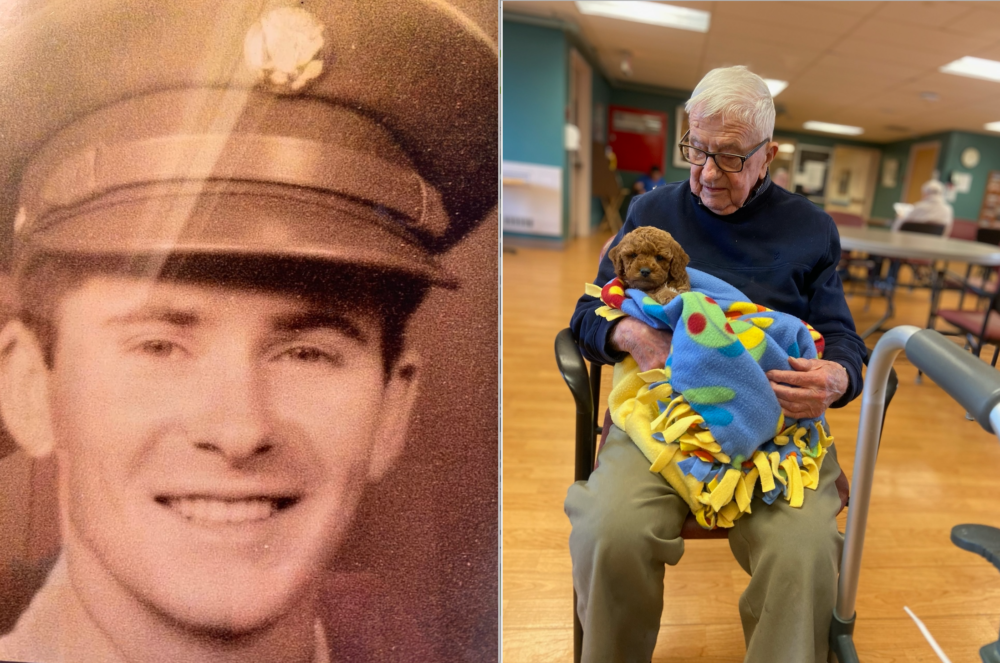
The following day, Monday March 30, details about the true extent of the outbreak at the Soldiers’ Home became public. At that point, 11 veteran residents had died and more than a dozen other residents and staff had tested positive.
There was a large refrigerated truck parked near the building to accommodate the bodies.
By the end of the week, there were 22 veterans dead, 16 directly attributed to COVID-19. At least 59 other residents and 18 employees also tested positive, according to the state. On Monday, the number of veterans who died there rose again — to 25.
It remains unclear exactly why the situation got so out of control and why state and local officials didn't immediately know about the outbreak, but Gov. Charlie Baker has hired an independent investigator to find out. In the meantime, the state Executive Office of Health and Human Services has provided updates on the Soldiers' Home in press releases and briefings.
On the Monday the outbreak became public, state officials said the facility was isolating and quarantining people in accordance with federal guidelines. It also said it would test all residents and let families know if a loved one tested positive. And throughout the week, state officials -- including Gov. Baker and Health and Human Services Secretary Marylou Sudders — have continuously touted the family hotline, a dedicated number people with loved ones in the facility can call for up-to-date information.
But according to McEwan and her daughter, Maura Fierro, what the state is saying doesn’t comport with what they’ve experienced.
After watching the news on Monday evening, McEwan says she called the Soldiers’ Home over and over until finally someone at the front desk picked up. She says the person who answered couldn’t tell her whether the virus had spread to her father’s floor.
“They just said, “Your father is fine and he’s sleeping,'" she recalls.
The following morning, McEwan says she called the family hotline dozens of times but no one answered. When someone finally did pick up, she says the person was “very vague about everything” and couldn’t give her any information about her father.
She had heard from a friend that employees at the Soldiers’ Home were working double-shifts because their colleagues were falling ill, and suddenly, she wasn’t just worried that her father was sick. What if he was alone, struggling to breathe with no one to help him?
There was so little information and so little communication with families, she said through tears.
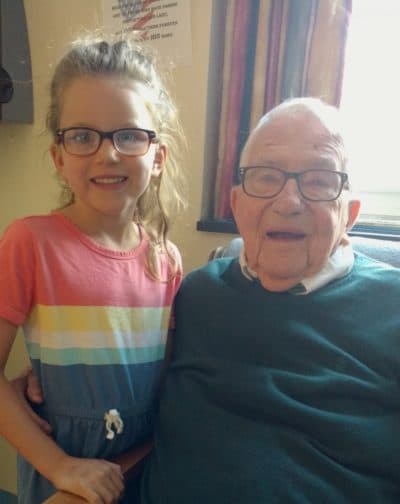
On Wednesday, she reached an employee on her father’s floor, but says the woman she spoke with couldn’t provide any information and suggested she call the Holyoke Health Department. McEwan says she got off the phone feeling “disheartened” and “very upset.”
“I thought, who is running these lines?” she says. She called the health department, but as she predicted, was referred back to the family hotline.
The family hotline at the Soldiers’ Home operates from 8 a.m. to 6 p.m. during the week, and McEwan says she called over and over again on Wednesday and Thursday. Finally, around 5:45 p.m. on Thursday evening, someone answered. McEwan doesn’t recall his name, but she does know he was a lieutenant in the National Guard.
“This man was very compassionate and kind,” she says. “He said they had been brought in to clean up the mess. Those were his exact words, ‘We were brought in to clean up the mess here.’”
Because she had heard on the news that all residents had been tested, she asked the lieutenant to look into her father’s status.
“Honestly, because of our conversation with my dad on Sunday, I expected to hear ‘negative,’” she says. “But he said, ‘John MacKay: positive.’ And I froze. I just nearly collapsed hearing that.”
McEwan says she immediately called the nurses’ station on her father’s floor, but it took multiple tries before someone answered.
McEwan says she told the woman who picked up that someone from the family hotline said her father had tested positive for the coronavirus, and she wanted an update on his status. The nurse, according to McEwan, sounded surprised, and told her that her father hadn't tested positive — in fact, the nurse said, he was right down the hall eating dinner with other residents.
The nurse offered to get him, and McEwan waited on the line.
“My dad came to the telephone and he was short of breath. He was never usually short of breath … But every word he spoke, I could hear him breathing,” McEwan says. “He said, ‘Hi, who's this?’ I said, ‘It’s Ellen, dad.’ And he said, ‘Oh I’m so happy to hear you.’ He always said that, ‘I’m so happy to hear you.’”
“'Something’s going on,'” she says he told her. “'I can’t seem to get my breath.'”
She didn’t tell him that he’d tested positive for the coronavirus because the nurse had just said the opposite, and she didn’t want to alarm him unnecessarily. But she says she did tell him to be extra vigilant about cleanliness and hand-washing.
“He said, ‘I just want to beat this. I’m feeling really tired,’” McEwan recalls. She told him to go get some rest and that she’d talk to him the next day.
“I can't wait to see you,” she remembers him saying before he passed the phone back to the nurse.
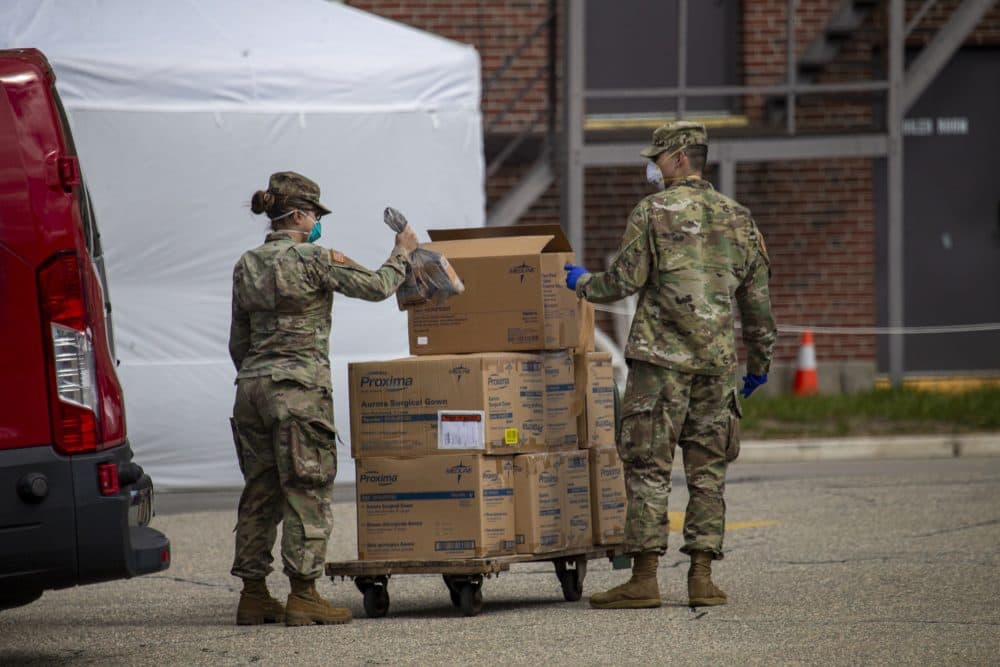
McEwan called the nurses’ station again later that night and spoke to the same nurse. The woman had spoken to her supervisor by then, and according to McEwan, told her that “whatever the National Guard told you is true.”
It was close to 9 p.m. by then and the nurse said her father was asleep — in the room he shared with two other veterans. Though separated by curtains, McEwan says their beds are typically less than six feet apart. What’s more, all the men on the floor use communal bathrooms.
“I said to my husband last night: The Soldiers’ Home, a place of honor. They don’t deserve this,” McEwan says.
Her daughter, Maura Fierro, puts it more bluntly in an email: “He left a common dining area to come to the phone. He had been dining with fellow veterans as a positive coronavirus patient. This is a catastrophic situation.”
The state Department of Health and Human Services did not respond to a request for comment about the Soldiers' Home response, but in a press release Friday, said that "the majority of testing results" had come back. The release also said the facility was creating isolation and quarantine “zones” to separate residents who tested positive, residents who tested negative but are under observation, and residents who tested negative and haven’t had contact with someone who tested positive.
McEwan doesn't know if her father is in the proper zone since the National Guard was apparently aware that he had tested positive, but the nurses on his floor hadn’t been informed.
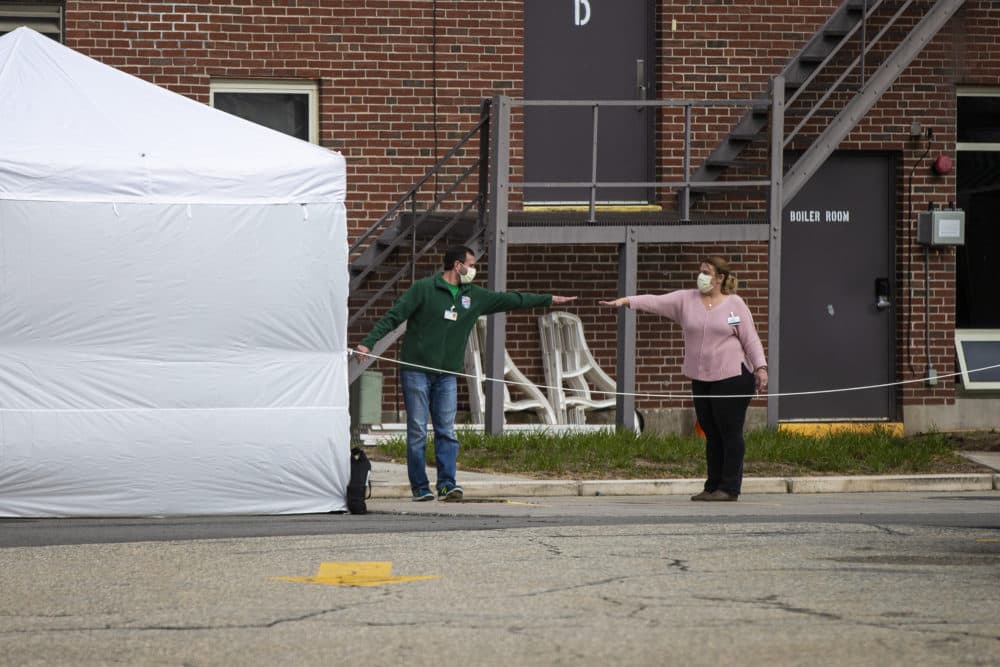
Meanwhile, on the floor where the outbreak began, an employee who spoke to WBUR Friday morning said residents were still sleeping four or five to a bedroom, and that nine beds had been “crammed” into a dining room.
On Saturday, the state said that those who tested positive were now in isolation, but the family confirmed Sunday that MacKay was still sleeping in a room with roommates. The family says they don't know whether his roommates tested positive or not.
“It’s like living a nightmare," McEwan says. "I mean, the whole coronavirus [is like living a nightmare], but then to actually have someone so near and dear be [sick] … I’m so scared that there’s not much time.”
Not much time left for her, for her sisters, for their children and grandchildren, to speak with MacKay.
“My heart is heavy," she says. "I’m just crushed."
This article was originally published on April 05, 2020.
This segment aired on April 7, 2020.
